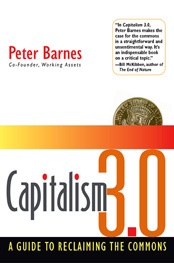FROM THE LOS ANGELES TIMES
January 5, 2007
By Lee Drutman
PETER BARNES is a businessman in a quandary. He’s a firm believer in free markets, but he’s also convinced that our current version of resource-depleting, pollution-spewing capitalism is pushing nature ever closer to collapse — and generating a gaping divide between rich and poor that increasingly defies all conceptions of fairness.
Yet Barnes is no fan of government either. It’s too susceptible to corporate pressure to be effective, he argues, and besides, do we really want politicians setting prices?
The co-founder and former president of Working Assets Long Distance, a telephone service that donates to nonprofit organizations, thinks he has a better idea: Establish an independent “common wealth” sector to protect shared assets like air and water, and maybe even cultures and communities. Secure these assets in a trust that belongs to everyone, he writes in “Capitalism 3.0,” and profit-making corporations couldn’t wantonly gobble them up. Plus, everybody would benefit equally from their use. If it sounds farfetched, maybe that’s the point: “We ignore common wealth because it lacks price tags and property rights,” warns Barnes, who already has incorporated a nonprofit organization called the Sky Trust to protect the atmosphere.
Barnes’ tale of capitalism gone mad begins with the Industrial Revolution, when the primary social problem was a scarcity of goods and the primary economic problem was coordinating limited investment capital. Land and natural resources, by contrast, appeared endless. Hence, what he calls Capitalism 1.0 developed with rules and practices that privileged capital above all else, particularly the joint-stock corporation.
By 1950, scarcity was no longer a problem. But the great engines of capitalism, already programmed to maximize production and profitability, were incapable of slowing down. Instead, they entered a new phase Barnes calls Capitalism 2.0. Instead of filling human and social needs, he writes, they began creating what Dr. Seuss’ villain in “The Lorax” calls “thneeds,” things we didn’t know we needed. Worse, corporations continue to impose their “illth,” British critic and author John Ruskin’s word for goods produced by an economy that don’t contribute to human welfare, on a natural environment whose capacity for absorbing is far less boundless that previously thought.
Barnes is at his best in diagnosing the structural maladies in today’s iteration of capitalism, which has created a “world is awash with capital, most of it devoted to speculation” but “healthy ecosystems are increasingly scarce.” The main problem, as he sees it, has to do with the three algorithms that drive market behavior: Maximize return to capital; distribute property income on a per-share basis, and the value, or price, put on nature is zero. And, he notes, 5% of the world’s people control half the property shares.
The obvious moral of “The Lorax” parable, in which the evil Once-ler cuts down all the truffula trees to make thneeds, Barnes says, is that “trees need property rights too.” If the trees belonged to everyone, held in trust, their price would not be zero — the Once-ler would have to pay (and the trust would be responsible for protecting the trees from extinction). Such a set-up, the author argues, would not only protect nature, but also allow everyone (not just the wealthy) to benefit equally from its occasional use. If such a plan were implemented properly, this would be what Barnes calls “Capitalism 3.0,” in which “[w]e’ll have more things we truly need — healthier ecosystems, communities, culture — and fewer thneeds.”
Barnes’ new and improved capitalism is more an exploration than a detailed plan. Even if the details prove unworkable (and they may very well), he deserves plaudits for offering a way past the stale debates of statism versus privatization. Instead of chiding greedy capitalists and venal politicians, perhaps we ought to look more closely at the rules and incentives to which they are duly bound to respond. And perhaps in doing so we will discover something new right under our noses.

